Making Black History in Caledon
A new museum exhibit called Our Voices, Our Journeys celebrates local black history through the personal stories of a Caledon congregation’s pioneering contributions to Headwaters.
*Editor’s note: This story was written before the fallout of the coronavirus hit our community. Many of the businesses and organizations mentioned here may be temporarily closed or offering alternative customer service options.
Despite the bitter February afternoon, Bishop Ronald Kelly exudes extraordinary warmth, beckoning me through the side door of North Peel Community Church in the south Caledon hamlet of Sandhill. Inside I meet Pastor Claudette Kelly, his wife of nearly 50 years. The two have come straight from Black History Month celebrations at two schools in their hometown of Shelburne. The Kellys and their predominantly black church congregation of about 60 have been contributing to the celebrations for years.
The couple’s work and congregation, which includes Canadians from as far afield as Jamaica, Trinidad, Guyana and Lebanon, are the subject of a new exhibit at the Peel Art Gallery, Museum and Archives in Brampton. Titled Our Voices, Our Journeys: Black Communities in Peel and unveiled in February during Black History Month, the groundbreaking exhibit spotlights the history, leaders and contemporary stories of North Peel Community Church, one of many diverse black communities in Peel. Though the evolving exhibit was launched in just six weeks, it reflects a story five decades in the making.
Founding the church
“I’ll let her talk first,” Bishop Kelly defers, a gentleman of course, but perhaps more so signalling he and his wife are a team in every way. Pastor Kelly describes their journey to this house of worship, which was formerly St. Mark’s Anglican Church, built in 1871. The saga began with her first trip to visit friends in Canada from her home in Manchester, Jamaica – a much-needed respite after the tragic death of her father in 1964. Within a decade, she and Bishop Kelly were married and had settled in Brampton where they started a family and focused on what had always been foundational for both – building a community of Christian faith. As their ministry grew they sought a permanent home base, their own church. But finding the right, affordable spot wasn’t easy.
“Then the real estate agent told us about this property, but it was not ready for church services,” chuckles Bishop Kelly. “You’d walk in and see the sky through the ceiling. No heat, no water. But from then on we never stopped. We kept working and working.”
That was in 1983. The Kellys sold their Brampton house, bought the decommissioned church and moved their young family into a trailer on the property.
Bishop Kelly went to school to learn the required building trades, then led the young, enthusiastic congregation in rebuilding and expanding their new home. Indeed, the hands of both the Kellys and many still in this community built the room we are sitting in.
Local Caledon farmers supported the church community from the get-go, helping mow the lawn and contributing to church garage sales held to raise funds for the repairs. “I remember Harvey Cook and his brother came over to help scrub the old wood floors in preparation for the first wedding held here,” says Bishop Kelly. Cook was a farmer who owned the surrounding land. Before he sold his farm and moved, he ensured the church got another small piece of property for the additional parking required by the growing congregation.
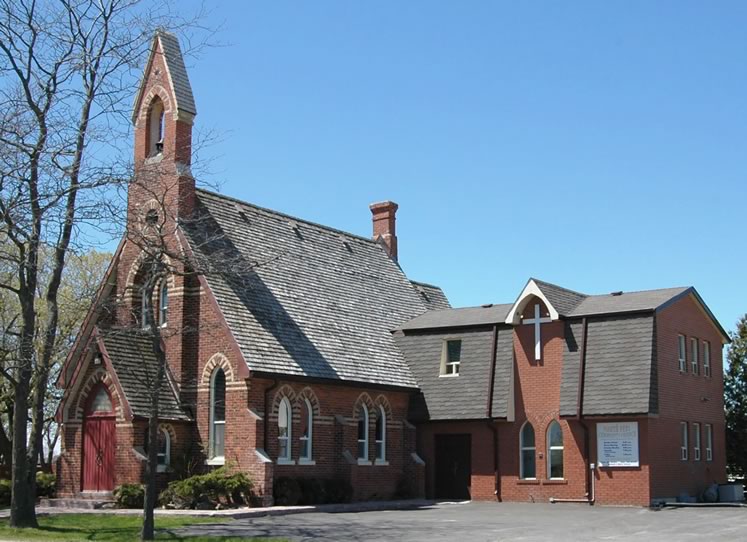
The church today
A lot has changed since 1983. Brampton is now almost next door. There’s a street light at the Sandhill crossroad, along with much more traffic on nearby Airport Road. Bishop and Pastor Kelly are not so young anymore, but still remarkably energetic. And indeed, the church is beautifully renovated with a new roof, new windows, new carpeting, new comfortable seating and two floors of Sunday school, meeting and administrative space. And as ever, there are plans to do more. But what matters most to the Kellys is not the physical building. Nor is it the accomplishments that advance only their group. What matters most is service – to their faith and the community.
Many original members, including their children and now grandchildren, are still with the congregation. Even some members who have moved away continue to support the church, which has a thriving youth ministry. And this sense of community extends well beyond their church.
For 19 years North Peel Community Church has run summer camps open to all youth in the region. They are active in local food drives. They are leaders and collaborators at The Exchange in Bolton, a community hub that brings together Caledon residents to respond to community needs. They even agreed to put a Canada Post community mailbox on the church property to connect with nearby neighbours. Still, it’s the commitment to share Canada’s black history within the Headwaters region that has recently sparked a new way for the church to make big difference.
“When we first came to Canada, we did not learn anything about Canadian black history. Nothing of the story of black people here was reflected back to us,” explains Bishop Kelly. This void inspired the Kellys to bring Black History Month lessons and celebrations to local schools. “What we knew of history, we carried with us, and it’s a rich history that should be preserved for our children.”
Two years ago Bolton resident Kevin Junor, the church’s district elder, led an initiative to take things further. An active captain in the Armed Forces reserves and the Toronto Scottish Regiment’s first black regimental sergeant major, Junor reached out to Caledon town council. He proposed expanding the town’s black history celebrations and education, sharing the church’s vision of profiling black trailblazers, inspiring future leaders and using the past as a roadmap to help young people become successful. The town endorsed the idea, and the church’s congregation created a new Caledon Black History Month presentation. And this proved to be just the beginning.
PAMA gets involved
This past year, in response to the Caledon presentations, PAMA’s team consulted the town for assistance in creating an exhibit about local black history, part of the museum’s new focus on building regional engagement. The town connected the team directly to North Peel Community Church. “We met with church leaders and helped produce this year’s Black History Month exhibit in Caledon, which tells the story of an array of black leaders across Canada and internationally,” explains Sam Cronk, PAMA’s senior curator of history. “But then we proposed something different. We asked – maybe you could tell your story at PAMA.”
The idea represented a dramatic pivot for both organizations. Our Voices, Our Journeys soon took shape as an exhibit space for featuring contemporary first-person stories from Peel’s diverse communities.
“Too often museums become places where culture is frozen under glass, where things of the past are not considered relevant to contemporary experience. This was an opportunity to change that dynamic at PAMA,” explains Cronk. It was also an opportunity to partner with a community in Peel that hadn’t really taken part in museum exhibits before.
“A lot of people don’t feel they belong in museums. They feel they won’t see themselves in what’s represented here,” explains Erin Fernandes, PAMA’s marketing co-ordinator. “We’re trying to change that, making PAMA a community hub for all, helping give diverse groups a voice, recognizing how important they are and how we’re all connected across the region.” Both the church community and PAMA agreed that much of Canadian black history has been marginalized. And they saw the joint venture as a step toward changing that.
Cronk and Fernandes believe the cornerstone of such change is building trust. “Nothing about us without us – that’s our mantra,” says Fernandes. Cronk jumps in: “We want our community partners to know they are co-creators in these experiences.”
All this was also a radical idea for North Peel Community Church leaders. This congregation embodies service to others. They are proud of and grateful for the work they do, but acknowledging their own history – and the chance to document and celebrate their specific story – was something entirely new.
“You know, it was seamless. It truly was,” says Junor, describing the process of sharing their stories and ideas for images and artifacts. He notes that while museum staff are the exhibit experts, the staff emphasized, “This is your story through your lens.”
The exhibit
At 9 Wellington Street East in downtown Brampton, a doorway leads into a beautiful stone exhibit space on the second floor of what used to be the town jail. This is where photos, artifacts and simply told stories bring to life the congregation’s journey – chronicles of immigration, family life and what it took to build a thriving faith community in Caledon. More stories will come in the months ahead.
One glass cabinet near the entrance is hard to miss. It showcases “Church Hats,” from ornate wide-brimmed designs to intricate fascinators. The caption explains the flourishing, centuries-old tradition: “From a young age, women in this congregation wear dress hats at church events as a sign of respect.”
Farther along, next to an image of Junor, a huge dog-eared dictionary is displayed under glass. The caption explains how, as a 10-year-old, Junor carried this cherished 15-pound book on the flight from Jamaica to Canada. His mother believed that the dictionary, which had belonged to her mother, anchored them to the family and home they were leaving behind.
And nearby, a fading colour photo shows a young Pastor Kelly cutting brush with machete in hand. She’s working alongside other congregation members as they prepare to lay the bricks for the first addition on the church’s east side. Another larger picture captures both Kellys today in their Sunday best. The nearby summary of their long journey ends with a message from Bishop Kelly to young people: “It can be challenging when others don’t know your culture. But don’t be afraid to join a new community, you can make a difference, help in your new community.”
I tell Cronk and Fernandes how moving, how eye-opening, I find this exploration of these everyday heroes, my Caledon neighbours. For PAMA staff, however, the ultimate measure of the success of this new venture is in the response of their co-creators.
A beaming Junor, who took his daughter and granddaughter on a Family Day visit to the exhibit, sums up that response: “A museum is where you go to see something else, someone else. In this case, we walked in and we saw us, a picture of the church, of Bishop and Pastor Kelly. These are people I can sit down and talk to, and now their story is being told here.”
Junor’s daughter took pictures and tweeted them out. “People responded, ‘Oh my gosh, this is wonderful. This is excellent!’” he says. “I think moving forward we’re going to see more of our young people stepping out, saying I want to tell my story and on a platform that says my story is worth telling.”
Next steps
Back at North Peel Community Church, my tour of the renovations undertaken over the years ends in the nave. Now a designated heritage structure, the church building is weathertight, fresh and obviously well-loved. It’s clear that it was lucky to find its second congregation. It’s also clear this is a community that always finds something new to strive toward.
“We’re in the process of planning another expansion behind,” says Bishop Kelly gesturing toward the rear of the first addition. “After all, we have a lot of young, inspired men and women in our church. All we can do is offer the platform, and let them go.”
A new beginning
A preview of some of the images and artifacts from Our Voices, Our Journey.
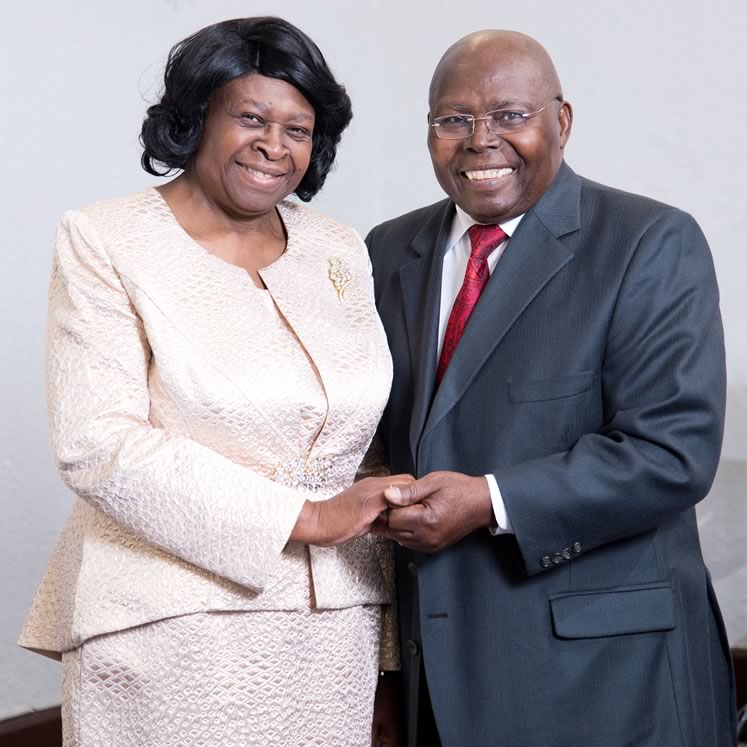
The North Peel Community Church in Sandhill was originally built in 1871 as an Anglican church. A stained glass window is one of a trio above the pulpit that survived years of decay and exposure before the derelict church was purchased by Pastor Claudette and Bishop Ronald Kelly (above) as a home for their growing congregation.
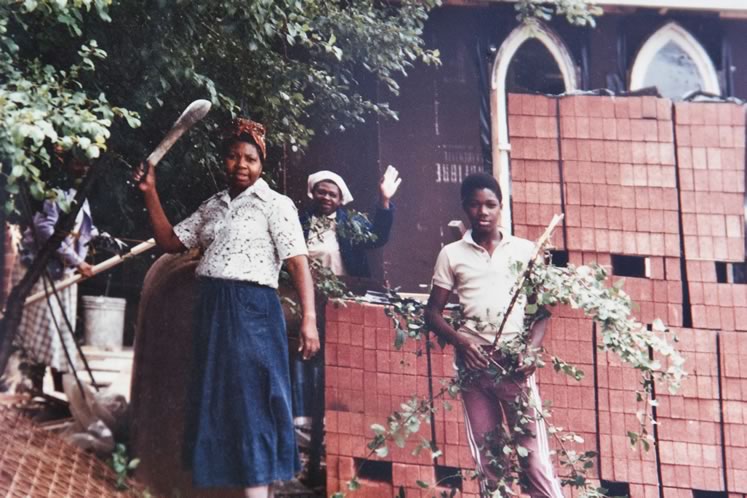
With the enthusiastic labour of church members (including a young Pastor Kelly cutting brush with a machete) and help from the surrounding farm community, the church was renovated and an extension added to house offices and Sunday school.

To help raise funds for a new roof, the Sunday school published a cookbook of Caribbean recipes – one of the everyday objects that tell the story of the church and its people.

One man’s story
On his flight to Canada, 10-year-old Kevin Junor carried a 15-pound dictionary once owned by his grandmother and treasured by his family as an heirloom from their Jamaican homeland.
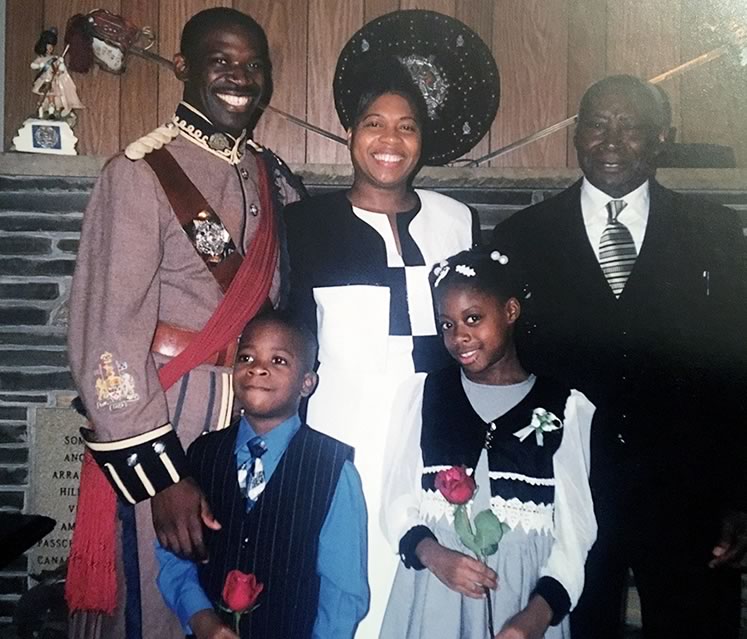
Junor, a Bolton resident and longtime church member, became the first black regimental sergeant major of the Toronto Scottish Regiment. Among the images in the PAMA exhibit is a 1998 photo showing him in full dress uniform on the day of his appointment, accompanied by his wife, Dianne, father Victor Hutchinson, and children Channing (left) and Shana.

An English manufacturer was inspired to make and market a toy soldier of Junor after he saw him on parade in England, sending Junor a certificate authenticating it was him.

The hand-carved walking stick Junor holds above also includes his likeness. It was crafted and presented to him with gratitude in Sierra Leone where he was deployed as a senior military advisor in 2007.



Church hats
The women and girls of the of North Peel congregation continue a tradition of wearing formal and often fanciful hats to church services. The three hats shown here are all from the collection of Pastor Claudette Kelly.
More Info
Our Voices, Our Journeys: Black Communities in Peel will be on exhibit at the Peel Art Gallery, Museum and Archives until fall 2021. PAMA is located at 9 Wellington Street East in downtown Brampton. See pama.peelregion.ca.
Related Stories
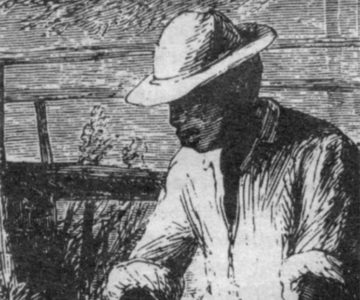
African Shadows
Nov 19, 1998 | | HeritageBlack settlers were among the first homesteaders in the hills, but little of their legacy remains.
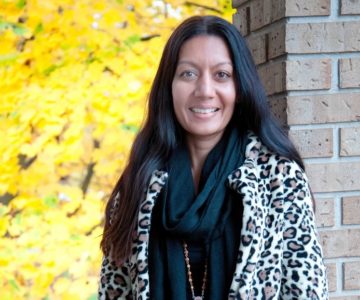
Up to the Task
Nov 24, 2020 | | CommunityFour members of Shelburne’s Anti-Black Racism, Anti-Racism and Discrimination Task Force discuss their mission and the vision they have for Shelburne.
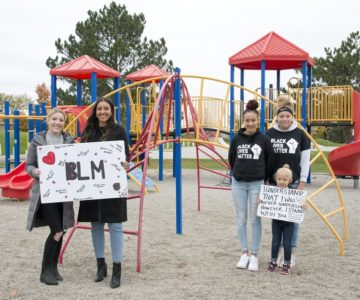
The New Hope: Local Black Lives Matter Organizers
Nov 24, 2020 | | Local HeroesThese four young women (plus one younger sister) were the moving force behind two crucial local social justice marches – one in Orangeville and one in Shelburne.












